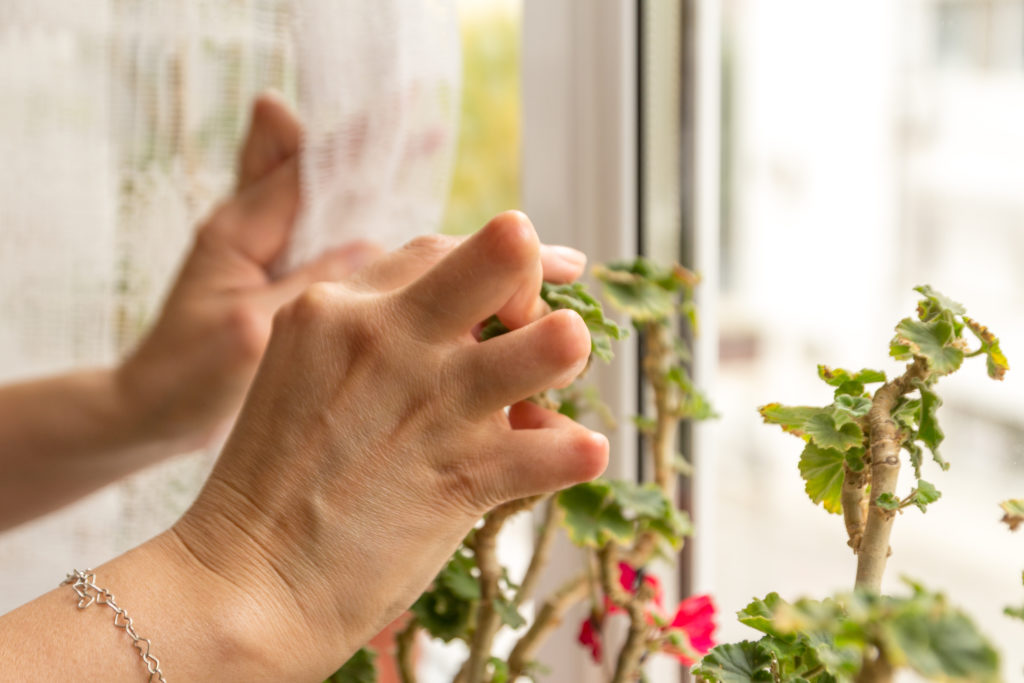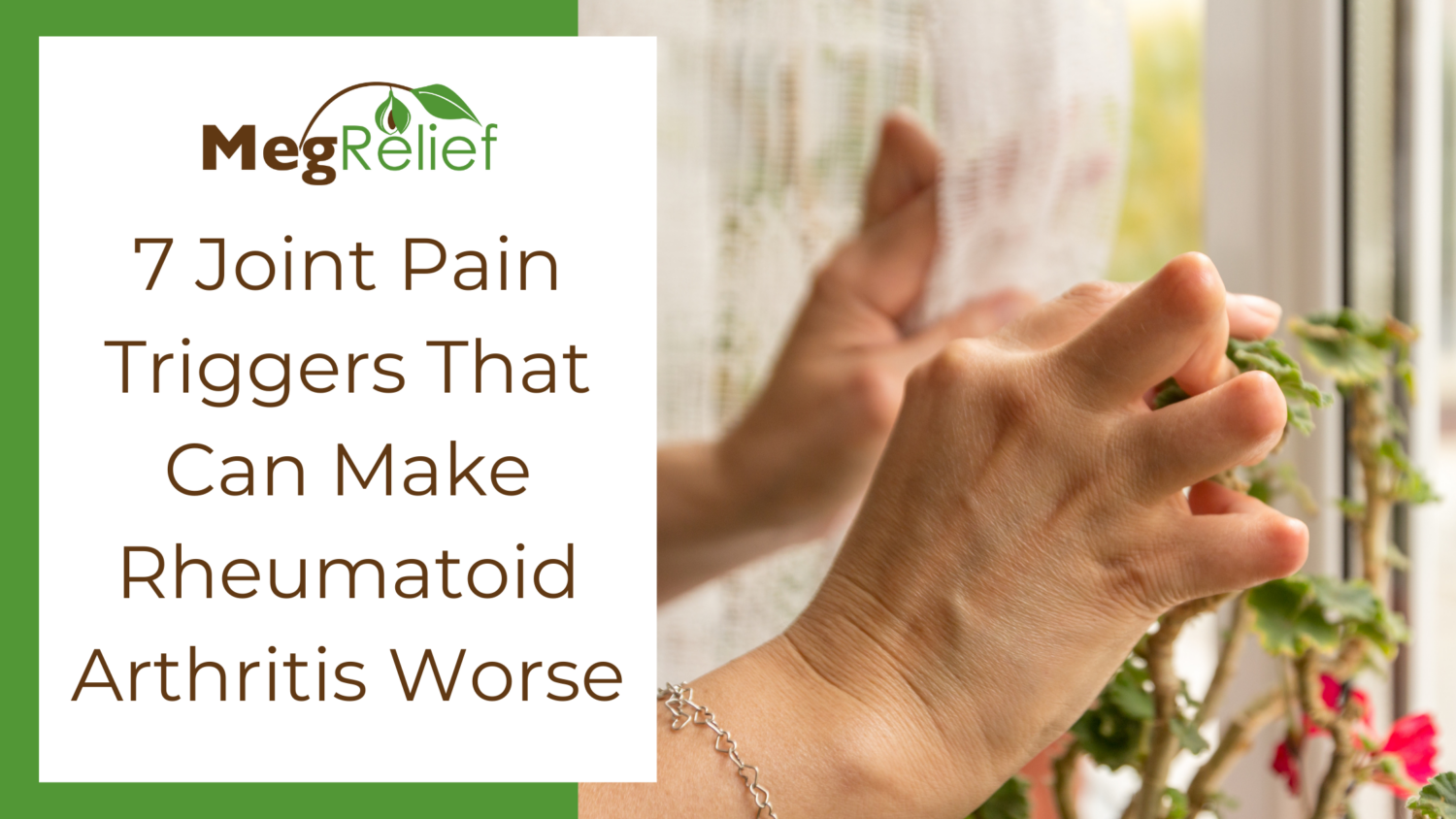If you live with rheumatoid arthritis (RA), you may begin to notice that certain things trigger the pain more than others.
If you are not sure of what those things are, you need to keep a log or journal of the things you eat, drink, and do each day, the weather, and when your pain level is at its highest and lowest.
This will give you an idea of what pain triggers are making your rheumatoid arthritis worse.

7 joint pain triggers that make Rheumatoid arthritis worse
There are many things that can trigger your RA to flare up.
Here are the seven most common joint pain triggers that flare up RA.
- Foods
- Weather
- Stress
- Obesity
- Smoking & alcohol
- Fatigue
- Infections
Those are just seven triggers. There are others as well, but let’s look at these seven first.
Foods can actually trigger flare-ups causing increased joint pain with RA. Foods that are high in inflammatory properties can cause extra inflammation and pain. Some examples include candy, processed foods, baked goods that contain white flour, and sodas to name a few. Basically, sugars and processed carbs should be left out of the diet or eaten in extreme moderation.
On the other hand, there are foods that have anti-inflammatory properties; replacing those foods that trigger a flare up with these foods can help reduce inflammation and make your pain level drop. Studies have shown that foods included in a Mediterranean diet fight inflammation and reduce stiffness. The Mediterranean diet follows the following principles: eat a plant-based diet consisting of fruits, vegetables, whole grains, legumes and nuts, replace butter with healthy fats such as canola and olive oil, use herbs and spices instead of salt to flavor foods, limit your intake of red meat, eat fish and poultry at least twice per week and get plenty of exercise. Foods with omega 3s have anti-inflammatory properties as well.
Weather While you cannot control the weather, there are things you can do to reduce the swelling and pain. If it is cold and damp, dress in layers, use hot packs, and try massaging in essential oils for rheumatoid arthritis.
The best essential oils for rheumatoid arthritis are eucalyptus, frankincense, lavender, evening primrose, MegRelief, turmeric, ginger, and basil. Of course, mixtures such as nutmeg peppermint are also effective.
Weight If you are overweight, you should try to reduce your weight and maintain a healthy weight. This reduces stress and load on the joints.
Smoking and alcohol can trigger RA. If you smoke, you should try to quit. If you have tried and have been unsuccessful, you should seek out a smoking cessation program in your area. Alcohol should be consumed in moderation like one or two times a year.
Fatigue is a big trigger for patients who have RA and rheumatoid arthritis can also cause fatigue. When your joints are inflamed and painful, it is hard to get the proper amount of sleep. You may need to lie down during the day even if you do not sleep to allow your body to rest for an hour. Lavender essential oil can also be used to promote sleep.
Infections can trigger your RA as the infection will trigger the immune system to fight it. With some infections, fatigue can result in causing more RA pain. During cold and flu season, you should wear a face mask when you go out to shop and when you go to other places where there a lot of people. If you think you have an infection, you should see your doctor.
These seven triggers are not always avoidable, but ones that can be avoided should be avoided such as foods and beverages, obesity, infections, and fatigue.
Other triggers
Some other things that triggers your rheumatoid arthritis to flare up are as follows:
- Overdoing exercise or exercise that is not low impact
- Not exercising at all
- Not following a schedule
- Environmental exposures such as asbestos or silica
- Pregnancy
- Depression
- Injuries
These are things that can cause a flare-up in your RA making the stiffness and pain worse.
Dealing with RA flare-ups
If you are in an RA flare-up, here are some tips to deal with it:
- During a flare-up, use hot and cold packs to help reduce the swelling and pain.
- Wear loose-fitting clothing so that your clothes do not constrict your swollen joints and cause more pain. In fact, you should wear clothes that have some room for swelling even when you do not have a flare-up, as you never know how quickly swelling can start.
- Extra rest during a flare-up should be a priority.
- Stress can cause an RA flare-up. During a flare-up, meditation can help reduce stress and, as a result, reduce the pain. Listening to soft music during mediation can help; there are even apps for smartphones that can help you meditate and relax.
- Low impact exercise and stretching such as walking and yoga, can reduce stress and depression. Depression causes pain and stiffness to become worse, so exercise will help not only the pain and stiffness, but the depression as well.
- Essential oils for RA can really help during a flare. Using lavender or chamomile at night and during periods of rest has a calming effect. Nutmeg, peppermint, and others have analgesic effects and anti-inflammatory properties as well.
- Watch your diet and speak with your doctor or nutritionist to make sure that you are getting enough vitamins and minerals through your diet.
- Drink plenty of water as this helps flush toxins from the body which could be causing inflammation and pain.
- Soak in a warm tub with Epsom salt; this can relieve pain and stress. You should make sure someone is home with you before you get in the tub, just in case you are not able to get out of the tub on your own. You can even put a few drops of essential oil such as lavender and chamomile in the water with the Epsom salt to provide a relaxing and soothing bath. If you do not have a tub or you live alone, standing a warm shower may provide relief also.
The seven joint pain triggers that can make Rheumatoid Arthritis worse are food, weather, stress, fatigue, being overweight, using alcohol and tobacco and infections. These tips above can help you cope with flare-ups, recognize your triggers in daily and Rheumatoid Arthritis.






